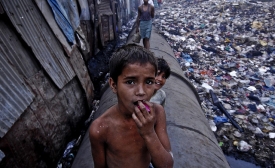india

In the new movie "Slumdog Millionaire" there is a poignant scene that all public diplomacy experts should have etched in their minds. It's of a classroom full of boys in a Mumbai slum inhabited by Moslems passing around one copy of the "Three Musketeers" as part of their English lesson. Later we watch one of those boys evolve into a gangster. He could just as easily have joined Al Qaeda. The scene takes place in the early 1980's, but I suspect that in spite of India's growth that similar scenes can be found today.
Much that is written about public diplomacy focuses on Europe and the Muslim world. National news media in the US, headquartered in New York and Washington, equates foreign opinion with approving editorials in The Guardian and large crowds in Berlin. By those criteria, President-elect Barack Obama is wildly popular. Just elect Obama, the thinking goes, and America's public diplomacy problems are solved.
Not quite: The data indicate Obama was never as popular in Asia as in Europe. And it turns out President Bush was never as unpopular in Asia as he was in Europe.
In the aftermath of the Beijing Olympics, there's been much discussion about an increase in China's soft power, not least by Joseph Nye, the originator of the concept. [Link] Nye and others (this writer included) have evaluated China's film industry and U.S.-Chinese co-productions as a strategic asset for the Middle Kingdom. I was discussing the subject recently with a U.S.







